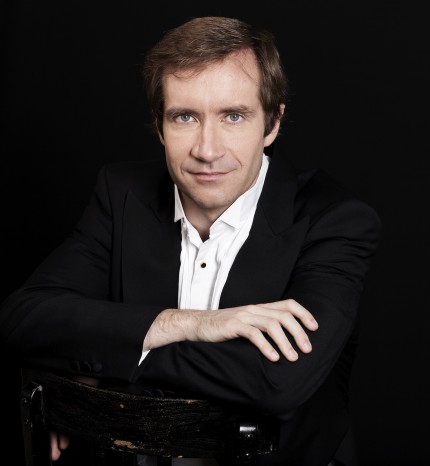Lugansky makes triumphant Chicago Symphony debut with powerhouse Rachmaninoff

Nikolai Lugansky performed Rachmaninoff's Piano Concerto No. 3 with Charles Dutoit and the Chicago Symphony Orchestra Thursday night. Photo: Caroline Doutre
Back for his annual Chicago Symphony Orchestra visit, Charles Dutoit opened his two-week stand Thursday with a late Romantic program coupling two big showpieces by Richard Strauss and Rachmaninoff.
Yet it was Nikolai Lugansky’s night. The Russian pianist made his CSO debut Thursday evening in spectacular style, tearing the roof off at 200 South Michigan with a galvanic, powerhouse performance of Rachmaninoff’s Piano Concerto No. 3.
Tackling the Russian composer’s Third Piano Concerto (colloquially, “Rach 3” in pop culture since the hit 1996 film Shine) may not be as impossible a feat as in decades past, with any number of prodigious steel-fingered prodigies able to encompass its manifold complexities.
Yet Lugansky, making an inexplicably belated Chicago Symphony bow, proceeded to bring a natural eloquence and lyrical poise to this score, coupled with faultless technique and astounding power in the most impressive CSO solo debut of recent seasons.
A student of Tatiana Nikolayeva, Lugansky, 39, won the top prize in the 1994 Tchaikovsky Competition. Well over six feet tall like Rachmaninoff himself, Lugansky possesses a similar indomitable strength and iron-fingered dexterity and has clearly taken note of his compatriot pianist-composer’s interpretive style in this music.
Taking a fleeter tempo in the opening movement than is usually heard, Lugansky immediately contrasted that with a more stately approach to the ensuing motif. Like Rachmaninoff, the pianist lofts the concerto’s lyrical themes in a graceful, poised manner that avoids heart-on-sleeve sentiment. Significantly, he took the shorter, less showy cadenza in the opening movement, building it inexorably to a statement of daunting force and weight.
Yet it was the depth and eloquence, the organic quality of Lugansky’s Rachmaninoff that distinguished this performance as much as the muscle and sonorous heft. Everything seemed to emerge naturally from what came before rather than a succession of brilliant isolated bursts as in so many young hotshots’ readings of this repertoire. The soloist brought a spontaneous quality to the ebb and flow of the brooding Intermezzo with the right mercurial lightness to the contrasting section.
Lugansky’s technical arsenal is complete—of the thousands of notes in this score, I don’t think he dropped a single one Thursday night. The finale was as exhilarating as any I’ve ever heard—fast, played with formidable arm strength and steadily accelerating momentum with the climactic lyrical theme taking flight as it should before the corruscating blizzard of notes in the whirlwind coda.
The rousing cheers brought the Russian pianist out for several curtain calls, and, for once in music that routinely gets such responses, the repeated ovations were richly deserved. Dutoit led an alert and responsive accompaniment, but it was Lugansky’s show. For all fans of Rachmaninoff or anyone who needs to be reminded of what a terrific work this is, do find time to catch this greatly gifted pianist at one of the repeat performances this holiday weekend.
Strauss’s Don Quixote, made a, well, quixotic companion piece for the Rachmaninoff. Surprisingly for this most Straussian of American orchestras, the composer’s episodic musical tone painting of Cervantes’ novel, hasn’t been played at a CSO subscription concert in 21 years.
Don Quixote seems to have lost some standing in the last two decades both as a concert piece as well as favored solo vehicle for guest star cellists. More often these days the work is done with the orchestra’s principal cellist taking the prominent concertante role, as is the case this week with John Sharp, just as he did in the last downtown performance in 1991 with Daniel Barenboim on the podium.
Perhaps an international soloist might have brought a bit more personality and outsized swagger to the more flamboyant sections of Strauss’s “Fantastic Variations on a Theme of Knightly Character.” But Sharp made up the balance with his refined tone and sensitive playing in the more inward passages. He brought great delicacy to the Night Vigil and a hushed and rarefied thread of pianissimo to the Don’s death. Principal viola Charles Pikler was a wonderfully vital and elegant Sancho Panza and concertmaster Robert Chen led a raft of CSO players in distinguished solo contributions.
Dutoit directed a flowing performance of fine transparency in a reading shorn of undue bombast. Still, Dutoit’s taut control often failed to bring out much of the work’s humor and sheer quirkiness with even Strauss’s squalling sheep barely making one smile.
The program will be repeated 1:30 p.m. Friday, 8 p.m. Saturday and 7:30 p.m. Tuesday. cso.org; 312-294-3000.